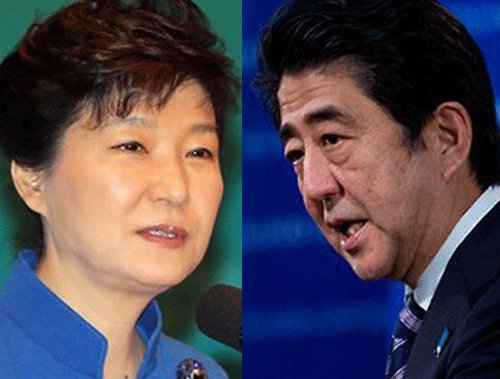The leaders of South Korea and Japan will hold their first-ever bilateral summit Monday in Seoul, paving the way for improved ties that remained strained for years over historic and territorial disputes.
 |
| (Yonhap) |
The summit will take place a day after trilateral talks among the two countries and China, Kim Kyoo-hyun, senior presidential secretary on foreign affairs said at Cheong Wa Dae on Wednesday. The leaders will have an in-depth talk on a wide range of issues including sex slaves, but they won’t be having an official luncheon, he said.
The confirmation comes two days after the office said that Seoul had proposed to Tokyo to hold the meeting on Monday and was waiting for a response. Japan’s response was publicized through a news report by NHK earlier in the day.
Kim also confirmed that the three-way talks would be held at Cheong Wa Dae on Sunday afternoon. The leaders of the three countries will be sitting down for first time in three and a half years after a previous one held in Beijing in 2012.
“Taking the summit as an opportunity, efforts will be restored to expand (regional) cooperation by the three countries and to carry out joint works in various fields of mutual interests,” he said.
After the summit, the leaders will hold a joint press conference and attend a meeting of business representatives from the three countries as well as a welcoming banquet in the evening.
The three are expected to issue a joint statement after the summit as a customary procedure, but the officials are still in the course of negotiations before finalizing the agreements.
Prospects, however, remain bleak over the outcome of the Park-Abe summit, as the talks are being held without any immediate progress in the working-level negotiations on sex slaves.
Experts raised concerns that Abe is unlikely to address the critical issue of its wartime atrocities, particularly Korean women forced into sexual slavery during World War II.
The relationship between the two countries has been sour for years over issues deeply rooted in history. South Korea demands Japan to take steps toward what Seoul regards as proper atonement for its wartime atrocities, while Tokyo insists all issues related to its 1910-45 colonial rule were settled in 1965 under a treaty that normalized bilateral ties in return for an economic aid package from Japan.
Despite dominant pessimistic views that Seoul won’t be able to get what it wants from Tokyo from the summit, citing the complexity of sex slave issue, experts said the meeting would help the two country expand economic and regional security ties.
Seoul’s push to revive the trilateral meeting is also significant in terms of improving ties for regional security and economic cooperation, they said, adding that the relationship between China and Japan is as important as that between Seoul and Tokyo.
Cho Sei-young, a former career diplomat and an international relations professor at Dongseo University, said that the two sides should not press each other to produce a substantial outcome in their first summit.
“The two sides should not overdo themselves, they should rather maintain their composure in order to make the summit an opportunity to continue efforts for improved ties in the future. … If they press each other too hard, things could go wrong,” he said.
Professor Park Young-joon of Korea National Defense University agreed.
“For years, the bilateral relations have remained weak over the issue of sex slaves, but this summit is an opportunity for the two to start work again to promote trade and expand investment,” he said.
The summit between Park and Abe had been widely predicted for several weeks, and was further confirmed during her official trip to Washington two weeks ago. There, Park said she was open to a one-on-one meeting with Abe on condition that it should be “meaningful” in resolving pending issues including a proper apology to sex slaves.
Park’s proposal was welcomed by U.S. President Barack Obama, as Washington has been eager for the development of bilateral ties between Seoul and Tokyo, amid the growing economic and military power of China and North Korea’s continued nuclear ambitions.
By Cho Chung-un (christory@heraldcorp.com)

